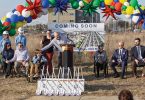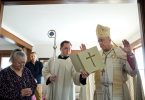by Kara Hansen
KANSAS CITY, Kan. — Few laypeople can boast they have an archbishop’s ear.
But that number has just grown by 19, as a group comprised primarily of laypeople has now joined Archbishop Joseph Naumann’s closest advisers.
A newly formed archdiocesan pastoral council met for the first time March 16. The council’s members represent various regions and constituencies of the archdiocese and are charged with providing advice, feedback, and direction on issues and activities that affect Catholics in the archdiocese.
“The Archdiocesan Pastoral Council is one of several bodies that serve to advise the archbishop,” said Father Gary Pennings, chancellor for the archdiocese. “For example, the Archdiocesan Finance Council advises the archbishop on financial matters and on fiscal policy for the archdiocese. The Presbyteral Council, a council made up of priests from the archdiocese, advises the archbishop on matters of both administrative and pastoral nature.”
In the first meeting of the pastoral council, Archbishop Naumann told council members he hoped they would help identify pastoral priorities and assist with meeting pastoral needs. He also encouraged members to view issues with a wide, archdiocesan viewpoint even though they each represent regions of the archdiocese.
“The Archdiocesan Pastoral Council’s purpose is to investigate and weigh matters which bear on pastoral activity in the archdiocese and to recommend practical solutions for the archbishop’s consideration,” said Father Pennings. “The council is made up of primarily laypersons from various parishes throughout the archdiocese.”
Archbishop Naumann also told members he had wanted to establish a pastoral council when he first came to the archdiocese, but waited until after pastoral regions were reorganized.
Father Pennings said the council’s membership was designed to be a broad representation of the archdiocesan church. Each pastoral region is represented by one member on the council. The Johnson County, Topeka, and Wyandotte County regions have additional representatives, as their regions contain higher numbers of Catholics. Two priests, one of whom is from the Presbyteral Council, and two Sisters from religious communities also serve on the council.
Considerable efforts were also made to ensure the council was diverse and representative of the parishes and populations across the archdiocese. One young adult representative, a representative from the Hispanic community, and a representative from Catholic education round out the council members.
“I was really impressed — the council seemed very representative of the archdiocese,” said Laura Fortmeyer, a parishioner of Sacred Heart Parish in Sabetha and a member of the council. “Everyone there seemed to be thoughtful and provide a lot of depth to discussions. People seemed to bring a great deal of experience from their parishes and ministries.”
Lay representatives were chosen from a list of nominees submitted by priests in each of the archdiocesan regions. The archdiocesan office of Hispanic ministry nominated the representative from the Hispanic community, and the archdiocesan education office nominated a school principal as its representative.
“In addition, the archbishop has the right to appoint up to three additional people to the council to ensure broad representation,” said Father Pennings.
The vicar general, Msgr. Tom Tank, and Father Pennings serve as ex officio members. The director of communications and planning for the archdiocese, Carroll Macke, functions as recording secretary for the council and performs other duties as assigned.
The first pastoral council meeting began with dinner and vespers, and continued into a discussion on the purpose of the council as well as a chance to provide feedback on the specific topics for that evening: evangelization and marriage.
“I thought the entire meeting was well organized and the purpose of the council — as well as our role — was explained very well,” said Margaret Blevins, a member of the council and parishioner at St. Francis Xavier Parish in Mayetta.
Macke said he felt members of the council would provide invaluable direction and feedback.
“Everyone seemed to be engaged in the discussions and many had questions. I think they gave good feedback that will be helpful to the archbishop,” he said.
The council is scheduled to meet on a regular basis three times a year, but the archbishop can convene the council for additional meetings, should the need arise. Although the council has been formed for a three-year term, the archbishop can reconstitute it if he so desires, said Father Pennings.






